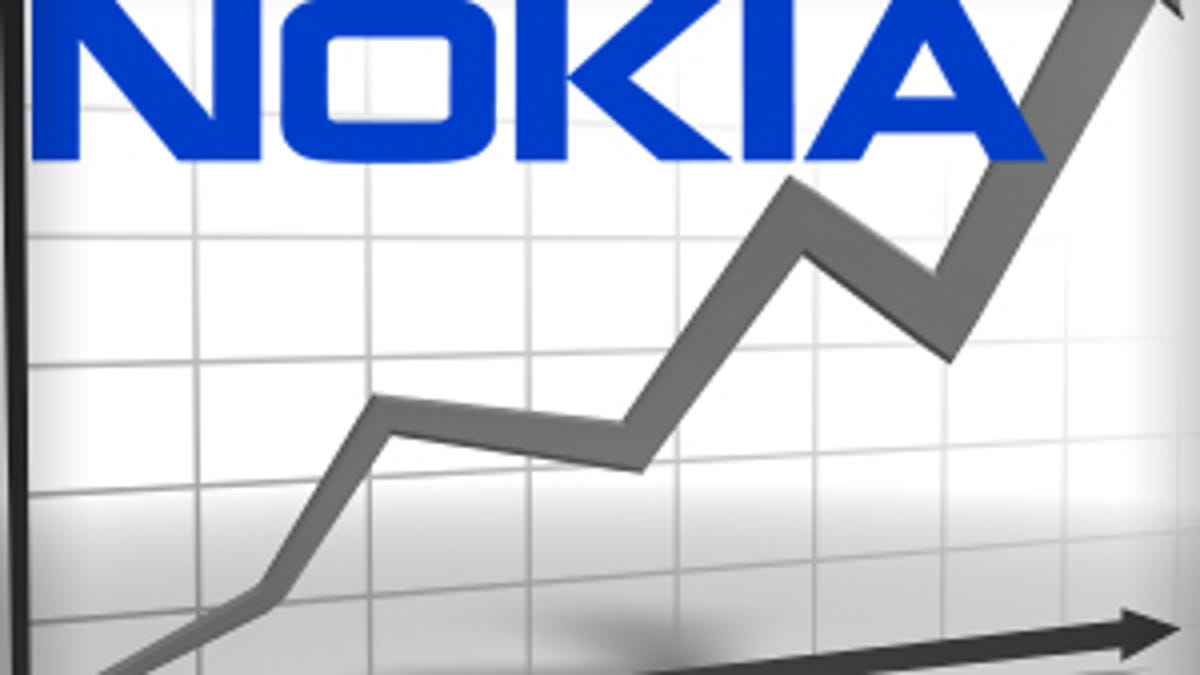Nokia's quarter shows glimmer of light amid dark times
Mobile phone shipments lift third-quarter profits over what analysts had expected, but Nokia still has a long way to go with its big shift to Windows Phone.

Better-than-expected phone sales during a difficult transition period helped Nokia report financial results today that surpassed analysts' predictions for the third quarter.
Revenue of 8.98 billion euros, or $12.2 billion, were a bit ahead of analysts' average expectation of $12.16 billion, according to those surveyed by Thomson Reuters. And excluding one-time items, earnings of 4 cents per share were well above the loss of 2 cents expected.
That doesn't mean Nokia, which is partway through moving from its own operating systems to Microsoft's Windows Phone, is laughing all the way to the bank. Its revenue still was down 13 percent compared to the year-earlier quarter, and including one-time items, the company had a loss of 2 cents per share.
CEO Stephen Elop was cautiously optimistic in a statement. "Our results in the third quarter indicate that our sales execution and channel inventory situation have improved. From a product standpoint, our overall mobile phones portfolio performed well," he said. And on a conference call, he added, "Overall I am pleased with Nokia's results this quarter. It is important to emphasize we are on a journey."
In trading before the market opened, Nokia's stock rose 62 cents, or 10 percent, to $6.74.
Mobile device shipments dropped from 110.4 million units in the year-earlier quarter to 106.6 million in the third quarter of 2011. Their average selling price (ASP) dropped from $89 to $70. Elop pointed to particular success with dual-SIM phones used in areas such as India where people use multiple wireless operators for better network coverage.
Though the overall environment is tough for Nokia, the result was well above analyst expectations of 93.5 million phones. Still, the scale of Nokia's transition is daunting, and the company has yet to even begin shipping its Windows Phone model.
"Nokia's results may be more of a placeholder, with the larger issue remaining whether or not consumers will adopt the upcoming Windows Phone," RBC Capital Markets analyst Mark Sue said in a report before the earnings. "Microsoft will commit billions of dollars to promote its new mobile OS, yet the momentum is still behind Apple and Android."
Nokia's overhaul was triggered by the arrival of the iPhone and Android phones at the high end of the smartphone market and by the profusion of inexpensive alternatives from China at the low end of the market. The company is winding down a midrange operating system, Symbian, and has ditched the higher-end MeeGo developed in cooperation with Intel.
Filling Nokia's OS void is Windows Phone, MIcrosoft's strongest candidate yet for relevance in the mobile phone market but not yet a force to match iOS and Android. Nokia is betting that Microsoft needs a powerful ally in the hardware business, and with most non-Apple handset makers fixated on Android, Windows Phone gives Nokia a chance to stand out from the crowd. That's especially true given that Nokia is a preferred Microsoft partner.
The first Windows phone from Nokia is due this year. It'll run the new Windows Phone 7.5, aka Mango, which Microsoft and handset makers have begun distributing for Windows Phone customers.
Nokia hired Elop just over a year ago from Microsoft, where he led the Office business. Just before Elop announced Nokia's Microsoft partnership, he offered a scathing assessment of Nokia's performance in his "burning platform" memo that likened Nokia's position to a person jumping off a burning oil-drilling platform into the North Sea.
Going after lower-end markets 'with vigor'
Interestingly, Elop expressed enthusiasm for the not-so-smartphone market that lacks the glamor and high price tags of smartphones. Although Nokia is relying on Windows Phone for its high-end phones, it also has a division striving to "connect next billion" people with lower-end models.
"It is clear we are able to take share away from smaller Chinese mobile manufacturers," Elop said during the conference call. "We need to attack these lower-end markets with vigor...That is what we will do."
He based his judgment on the observation that the dual-SIM models are bringing a "halo effect" that's helping other models sell--even older ones such as the Nokia 1616 that dates from 2010.
"The dual-SIM phones are driving increased traffic around, and correspondingly higher sales for, other devies in India," Elop said.
Elop didn't have much to offer in his prepared remarks about the upcoming Windows Phone product. "I am encouraged by our progress around the first Nokia experience with Windows Phone, and we look forward to bringing the experience to consumers in select countries later this quarter. We then intend to systematically increase the number of countries and launch partners during the course of 2012," Elop said in his statement.
Of Nokia's shipments in the quarter, smartphones accounted for 16.8 million units and came with an average selling price of $180, down from $183 a year earlier. The remaining 89.9 million phones had an ASP of $44, down from $55 a year earlier.
By comparison, Apple sold 17.1 million smartphones in its most recent quarter. Samsung shipped more than 20 million, the Wall Street Journal reported today, citing an unnamed source.
"The year-on-year decrease in our smart device volumes in the third quarter 2011 continued to be driven by the strong momentum of competing smartphone platforms relative to our higher-priced Symbian devices, as well as pricing tactics by certain competitors," Nokia said.
With $1.2 billion in net cash from operations, the company's cash and liquid assets increased over the quarter to $5.1 billion. As of September 30, 2011, the company employed 135,949 employees, compared to 131,553 at that point a year earlier.
Updated at 4:36 a.m. PT and 4:47 a.m. PT with further details from the earnings report. Updated at 5:27 a.m. PT with further comments from the conference call.

